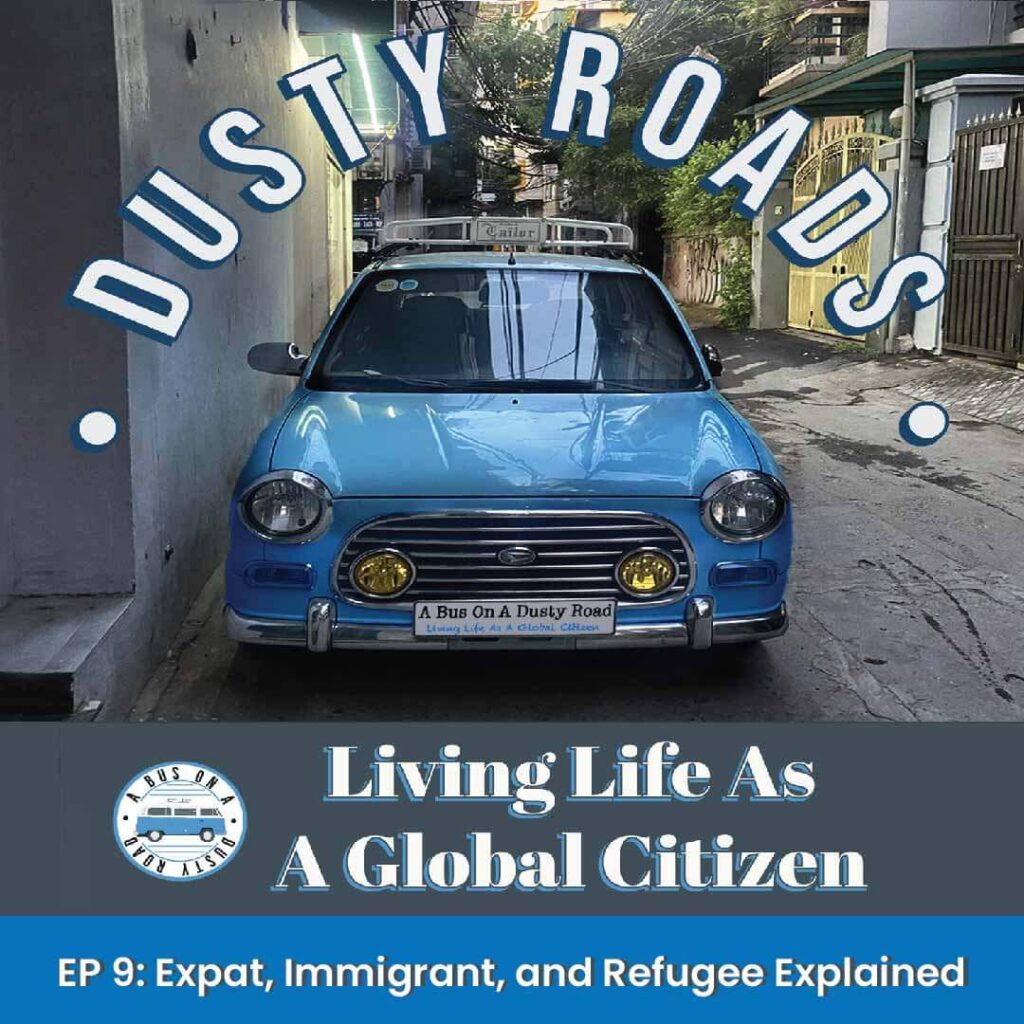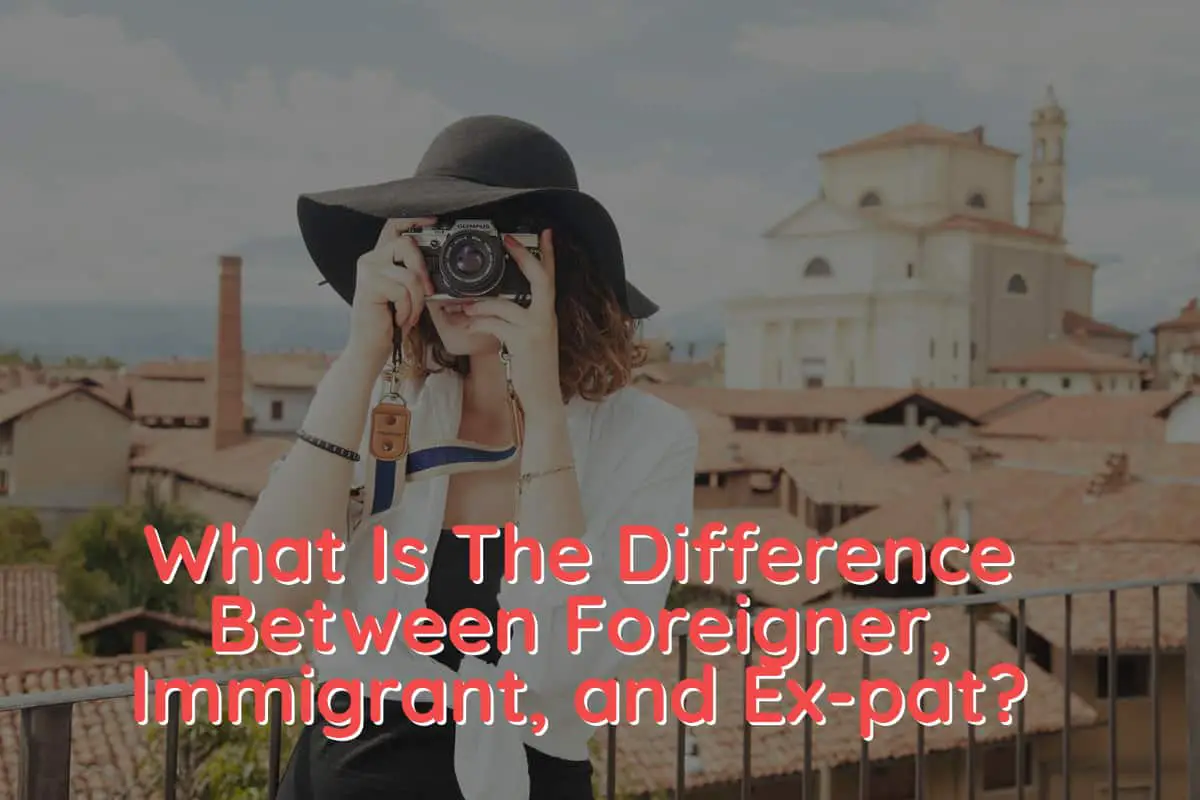The terms “foreigner”, “immigrant,” and “ex-pat” are often used interchangeably in everyday conversations, but they each have very different meanings. For those unfamiliar with the nuances of international travel and relocation, it can be hard to truly understand what distinguishes the three and how their unique backgrounds can make a world of difference in both relationships formed abroad as well for potential career opportunities.
A foreigner is born in or from a country other than their own. An immigrant is someone from another country who plans to live permanently in a country other than theirs. An ex-pat or expatriate lives and works in a country other than theirs. Both an immigrant and an ex-pat are usually considered foreigners.
Table of Contents
- Clarifying Terms: Understanding Foreigner, Immigrant, and Expat
- Frequently Asked Questions
- Related Questions
Clarifying Terms: Understanding Foreigner, Immigrant, and Expat
The terms “foreigner,” “immigrant,” and “expat” are often used interchangeably, yet they hold distinct meanings, especially in the context of international travel and relocation. Understanding these differences is crucial for grasping the subtle nuances in relationships and career opportunities that arise abroad.
A foreigner is someone from a different country than the one they are in. An immigrant is a person who moves to another country with the intention of permanent residency. In contrast, an expat (or expatriate) is an individual who lives and works in a country other than their native one, but may not intend to stay permanently.
Both immigrants and expats fall under the broader category of foreigners.
Definition Of A Foreigner
A foreigner is someone from another country. Sometimes, people will say, “The foreigner is not from these parts.” An example of this would be an American who is visiting Vietnam. Or a Canadian who is visiting America.
The dictionary definition of a foreigner is as follows:
“a person born in or coming from a country other than one’s own.”
Oxford
Usually, a foreigner is visiting, traveling to, or maybe staying in a place without the intention to be in that foreign country permanently. This means that a foreigner is in a country other than their own for a specific period.
An example of this may be somebody who goes on holiday to France but is from Germany. Their countries may be close together, but the Germans would still be considered foreigners in France.
Definition Of An Immigrant
An immigrant is someone who comes to live in a foreign country permanently. Immigrants have left their home country, realizing that they will never return to live permanently in their home country again.
The dictionary definition of an immigrant is as follows:
“a person who comes to live permanently in a foreign country.”
Oxford
Immigrants must undergo all the legal paperwork to stay in their host country. For example, immigrating to the United States can be difficult for most foreigners.
An immigrant will usually change their passport or have dual citizenship between both countries. This means they will become citizens in the country they are immigrating to.
Most people will immigrate to the United States either for a better opportunity for themselves and their families or because they have decided to get married to an American. Others are forced to leave their home countries due to war or safety issues.
Even if they were born in another country, most immigrants would now consider their new adopted country to be where they are from. If they immigrate to the United States, they now consider themselves American.
Many immigrants may consider themselves to have a dual kind of country identity. Some may say they are “Vietnamese-American,” “Mexican-American,” or “Swedish-American.” Many immigrants and their children may identify as having a dual cultural country identity even if they no longer hold a passport from their home country.
An example of this is my own mother. My mother was born and raised in Stockholm, Sweden. When she left Sweden in her early 20s, she came to the United States for a short time to work. She met my father, fell in love, and got married.
Because of her marriage to my father, my mother immigrated to the United States. People would always ask me, “Where is your mother from?” This is because she still had a Swedish accent, so even though she was an American citizen. My mother was considered an immigrant and a foreigner living in the United States.

Listen To Our Podcast About Expat, immigrants, and Refugee Explained below or by clicking here.
My mother was an immigrant because she left her home in Sweden to live permanently in the United States. But she was also a foreigner as she originally came from Sweden, not the United States.
But if you ask my mother or any of my siblings, we would probably say we were “Swedish-American.” This is because our cultural identity is between Sweden and America
Definition Of An Ex-pat
An Ex-pat is very different from an immigrant. An ex-pat lives overseas but does not plan on living there permanently.
Unlike an immigrant, an ex-pat will keep their citizenship in their home country even though they live and work abroad. An ex-pat can live overseas for an extended period; some may live their entire life.
The dictionary definition of an ex-pat is as follows:
“a person who lives outside their native country.”
Oxford
So this means that an ex-pat can be working or simply living overseas. The ex-pat will keep the passport of their native country, as most ex-pats plan to return to their own country at some point.
This is different from an immigrant who does not plan to return to their own country permanently. Most ex-pats plan to return to their own countries to live there again permanently. This is where things get slightly confusing because, as an immigrant, an ex-pat is considered a foreigner.
Both ex-pats and immigrants are foreigners as they were born or are from another country where they live. A person can be born in another country, not an immigrant or a foreigner.
For example, my uncle and aunt were both born in China. Both of my grandparents were American. Even though they were born in China, my uncle and aunt were never considered Chinese citizens but were always considered American and American citizens.
You can learn more about ex-pats by reading our blog 8 Main Reasons To Become An Ex-pat And Live Overseas by clicking here.
Differences between a foreigner, immigrant, and ex-pat can sometimes be confusing. The main thing to remember is that a foreigner was born or from a country where they are now. An immigrant is someone who comes from one country and plans to live in another country permanently. An ex-pat is someone living or working in a country other than theirs.
Frequently Asked Questions
What is the basic distinction between a foreigner, an immigrant, and an ex-pat?
a. A foreigner is someone from a different country.
b. An immigrant is a foreigner who intends to live permanently in a different country.
c. An ex-pat or expatriate is a foreigner who resides and works temporarily in a different country.
Is there any overlap between these terms?
Yes, both immigrants and ex-pats are considered foreigners, as they are individuals living in a country other than their own.
Can someone be an immigrant and an ex-pat simultaneously?
Yes, someone could be both an immigrant and an ex-pat if they have moved to a new country with the intention of staying permanently but are temporarily living and working there.
Are these terms universally applicable?
While these terms have general meanings, their usage and implications can vary culturally and contextually.
What is the typical duration of stay for an ex-pat?
Ex-pats often reside in a foreign country temporarily, which can range from a few months to several years, depending on their work assignment or personal situation.
Do ex-pats retain citizenship in their home country?
Yes, ex-pats typically retain their citizenship in their home country even while living abroad.
What’s the primary reason for someone to become an immigrant?
People become immigrants primarily for permanent resettlement, seeking better opportunities, family reunification, or asylum.
Can a foreigner become an ex-pat without being an immigrant?
Yes, a foreigner can become an ex-pat by moving temporarily to another country for work, without intending to become a permanent resident or immigrant.
Are there legal differences between immigrants and ex-pats?
Yes, immigrants usually undergo a more rigorous legal process, including obtaining visas, permits, and potentially citizenship, while ex-pats typically require work visas or similar permits.
At A Bus On A Dusty Road, we talk about history, travel, life, sailing, and ex-pat living. We are all about “Living Life As A Global Citizen.” We explore social, cultural, and economic issues and travel.
We would love to have you be part of our community. Sign up for our newsletter to keep up-to-date by clicking here. If you have any questions, you can contact me, Anita, by clicking here.
Listen to our Podcast called Dusty Roads. You can find it on all major podcast platforms. Try out listening to one of our podcasts by clicking here.
Subscribe to our A Bus On A Dusty Road YouTube Channel filled with great videos and information
Related Questions
How To Survive and Thrive Despite Uncertainty in Life?
Living with uncertainty is perhaps one of the hardest parts of living life. But, not everyone handles uncertainty the same way. Here are 6 tips you can use to deal with the uncertainty in life so that you survive and thrive in life 1) look uncertainty right in the eyes, 2) stop trying to control others, 3) learn to accept uncertainty as a part of life, 4) learn to focus on what you can control in life, 5) find healthy ways to manage stress and 6) use meditation and religion to deal with uncertainty.
You can discover more by reading the blog 6 Tips To Survive and Thrive Despite Uncertainty in Life by clicking here.
What is an Ex-pat or Expatriate?
An ex-pat is someone who lives in another country for an extended period of time. But even among the ex-pats, there are all different kinds of ex-pats and a variety of reasons why a person would become an ex-pat.
You can learn more by reading our blog What is an Expat or Expatriate? What You Need To Know by clicking here.



One response to “What Is The Difference Between A Foreigner, Immigrant, and Ex-pat?”
The point of view of your article has taught me a lot, and I already know how to improve the paper on gate.oi, thank you. https://www.gate.io/tr/signup/XwNAU